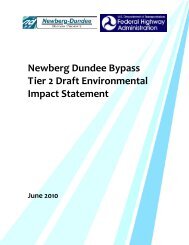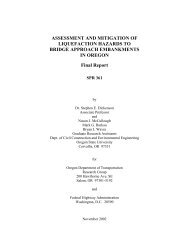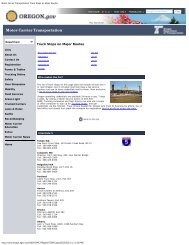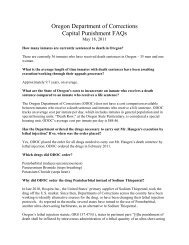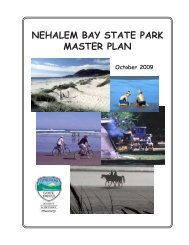Oregon Balance of State HIV/AIDS Housing & Services Systems ...
Oregon Balance of State HIV/AIDS Housing & Services Systems ...
Oregon Balance of State HIV/AIDS Housing & Services Systems ...
Create successful ePaper yourself
Turn your PDF publications into a flip-book with our unique Google optimized e-Paper software.
<strong>Oregon</strong> <strong>HIV</strong>/<strong>AIDS</strong> <strong>Housing</strong> and <strong>Services</strong> <strong>Systems</strong> Integration Plan 53<br />
Addictions and Mental Health<br />
11. Partner with substance abuse and mental health service providers to spotlight need<br />
and seek expanded support for these services.<br />
Capitalize on existing and new opportunities, such as the Expanding Community Living<br />
Opportunities, Community Mental Health <strong>Housing</strong> Fund, and Alcohol and Drug Free <strong>Housing</strong> Fund<br />
programs, to maximize the availability <strong>of</strong> resources to people affected by both <strong>HIV</strong>/<strong>AIDS</strong> and<br />
behavioral health issues.<br />
Make targeted presentations to Local Alcohol and Drug Planning Committees, which are appointed<br />
by county commissioners to identify needs and establish priorities for alcohol and other drug<br />
services in the county. 89<br />
Join efforts to advocate for increased state and local prioritization and funding for mental health and<br />
substance abuse services, as an important component in supporting client health and housing<br />
stability.<br />
When appropriate, encourage community- and faith-based organizations to provide, and seek to<br />
connect clients with, addiction counseling, peer networking, and other social support structures to<br />
address substance abuse issues.<br />
12. Build relationships with behavioral health crisis providers.<br />
Identify and pursue ways to access limited treatment beds for clients with behavioral health crises,<br />
including partnerships with mental health departments to refer OHOP clients to crisis beds. Support<br />
efforts to increase the number <strong>of</strong> crisis beds and to streamline access to them.<br />
Human <strong>Services</strong> and Public Assistance<br />
13. Prioritize education and outreach to local DHS <strong>of</strong>fices and community action agencies<br />
around <strong>HIV</strong>/<strong>AIDS</strong> and client issues, and support coordinated service delivery models.<br />
The Steering Committee advised that in the human services sector, outreach to relatively<br />
independent local <strong>of</strong>fices can be more valuable than outreach at the state level. Address<br />
coordination issues that can emerge in the delivery <strong>of</strong> services, rather than in policy, with these<br />
<strong>of</strong>fices. Fortify relationships with “one-stop” centers, such as the Rogue Valley Family Center, that<br />
provide evidence-based models <strong>of</strong> co-located services and assistance, and foster the replication <strong>of</strong><br />
this model when possible.<br />
Criminal Justice<br />
14. Pursue partnerships with local and state criminal justice agencies and stakeholders,<br />
and seek federal and other resources to serve people with incarceration histories.<br />
Expand on the success <strong>of</strong> the <strong>Oregon</strong> <strong>State</strong>wide Supportive Community Reentry initiative, and<br />
continue building relationships with Department <strong>of</strong> Corrections as well as with local criminal justice<br />
agencies.<br />
89 Contact information for local committees is available online at: http://www.oregon.gov/OHCS/HRS_ADF_Program.shtml<br />
(Accessed: January 25, 2008).



